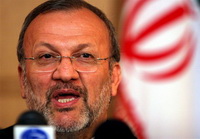Vienna Nuclear Talks: New Aggreement Is Considered Big Confidence Boost
Wednesday the head of the International Atomic Energy Agency said that Iranian negotiators had accepted a draft of an agreement to ship much of its stockpile of nuclear fuel to Russia. He cautioned, however, that it would have to be approved by Friday in both Tehran and Washington.

The key to the agreement, if it works, would lie in the timing of the shipments a detail officials were not discussing in Vienna in the hours after the announcement. If Iran actually sends the full 2,600 pounds of low-enriched uranium at issue to Russia in a single shipment, it would have too little fuel on hand to build a nuclear weapon for roughly a year, according to the agency's experts. But if the fuel leaves Iran in batches, the experts warn, Iran would have the ability to replace it almost as quickly as it leaves the country.
The 2,600 pounds amounts to about 75 percent of Iran's known stockpile of fuel. That estimate, as one senior European diplomat put it on the sidelines of the three days of negotiations here, "assumes that Iran has accurately declared how much fuel it possesses, and does not have a secret supply," The New York Times reports.
It was also reported, the delegations from Iran, France, Russia, the United States and the United Nations have until Friday to decide whether they will sign the agreement described by International Atomic Energy Agency chief Mohamed ElBaradei as "a balanced approach to the problem."
The agency is the United Nations' nuclear watchdog.
The delegates met in Vienna this week to work out the details of a tentative deal reached in early October.
That deal calls for low-enriched uranium produced in Iran to be sent abroad for further enrichment and then returned for use in medical research and treatment, CNN reports.
In the meantime, Mr ElBaradei said there had been many technical, legal and policy issues to address in the Vienna talks, as well as "issues of confidence and trust".
"That is why it has taken us some time and that is why we need to send the agreement to capitals for final approval," he added.
"I very much hope that people see the big picture - that this agreement could pave the way for a complete normalisation of relations between Iran and the international community."
The BBC's Bethany Bell in Vienna says the completion of the draft will be a big confidence boost for all involved in the talks, but many details are still to be worked out, BBC News reports.
Subscribe to Pravda.Ru Telegram channel, Facebook, RSS!




